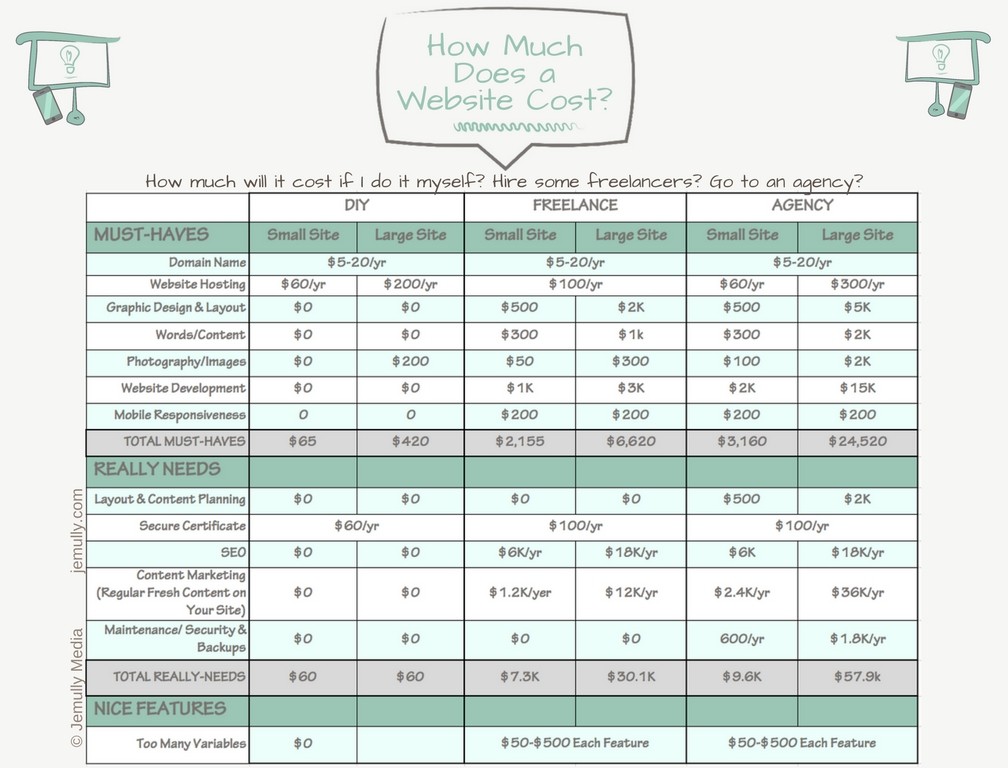You’ve got a business and you know you need to update your site. The site your company has now has old information and you admit that it looks old school. It is probably not mobile compliant – so you are missing customers who are looking for you on their mobile devices. The next logical step is to ask the question: how much does a new website cost? Are they ways to get all the features you want and still watch the budget?
How much will a new website cost?
You can do your research – in fact, that’s probably why you landed here. You are in the middle of the research now. We’ve put together some charts, and links, and a whole heap of helpful information for you. We hope this will save you some time as you learn about the various factors that will make an impact on how you spend your web development budget. Our goal is to inform you of things that you have to have for your business website, introduce you to a list of features you may want to include on your site, and guide you in making the decision as to who will build that site.

First, let’s take a glance at what others are saying. According to the Huffington Post,
“A website in 2017 should cost somewhere between $2,000 and $30,000. It’s a broad range; however, there are a handful of factors that affect the total cost and can help you narrow down what your investment will be.”
Huff Post’s list of factors that impact the price of the website deliverables are:
- the number of pages of your site
- the complexity of the site
- copywriting and photography
- and the question of whether or not the developer uses a content management system (CMS) that makes it easier if you want to make some of your own updates to the your site after it goes live.
Our experience and our research support both the price range and the website factors quoted by the Huffington Post article. The remainder of this article will guide you with additional factors that move the budget needle left or right.

Now, let’s examine who will build your website – and break out the pros and cons of each of your web developer options and how it will impact your development budget. To start with, you may be considering one of the two more budget-conscious options – building the site yourself or letting a friend build it for you. In the middle of the budget chart is a another option – you may hire a individual freelance web developer to update your website. And, finally, you may be looking towards a marketing agency that has a team of developers, copywriters, graphic designers, and marketing specialists. The agency option is not for every business owner. Only those businesses who intend to utilize their website as a sales and marketing tool will lean toward the option of engaging a team.
Each of these options has some up sides and some down. We will suggest a few of the pros and the cons of working with each so your decision will be an informed one. After all, in this day and age, your website is so very important to your business. I would even go so far as to say it is vital to your company’s success.
The Importance of Your Website
- Your website is a combination of your online showroom and a window into your expertise.
- Next, your website should serve as your central hub for all of your online activity — the place where all of your social media, email marketing, and traditional marketing take your prospects.
- Lastly, it is in visiting your website that people will learn to trust you as an expert in your field and identify the things that make your company different from your competition.

OPTION 1: Free – DIY (Built It Yourself)
There are some free-ish places to get your website and build it yourself. Let’s start with a Wix, Weebly, or Squarespace website. If you want to build your own website using one of these services, you hang a few pictures on the digital walls, type up some words about your company, and your business moves right in. You will ultimately have to pay hosting – if not initially, then in the second year and in the years following.
- Domain Name – There is a fee to register your own domain name. You must renew your domain name annually and pay an annual fee. Some plans offer the domain name free for the 1st year.
- Rent, Not Own – You don’t own your website – you are renting it.
- Pre-Fab Designs – Most people’s skills are limited in what they can do to make the pre-fab site look less pre-fab and more professional. There is a learning curve to figure out how to grant a customized look to a pre-fab website. Some folks enjoy this challenge. Others find it frustrating. Either way, your time dedicated to the project should be considered in your budget.
- Limited Free Features – Many add-on features that give your site extended functionality are only available for a fee. A couple of examples of these add-on features are; a search feature to help your customers find specific information, or a Google map that shows your business location.
- Editing Challenges – You may be a graphic designer, a web developer, a photographer, or a writer, but, like most of us, you are probably not all four.
- Analytics – There is an additional cost to add Google Analytics. If you don’t have analytics on your site, how will you know how much traffic your website is getting and where that traffic is coming from?
- Branded – If you build on Wix, you will have to pay to remove the Wix logo and ads from your site. And if you decide not to pay that extra fee, everyone will know you put up a free website for your business.
Still not sure if you should save some money and build your own site? Read our post entitled, “My Friend Built My Website (The Real Cost Of A Free Website).” It will give you more things to mull over.

OPTION 2: Free – Built by Friend or Family
Many people know a friend or family member who has a some technical skills – they have taken a class, or enjoy doing some things online as a hobby, or they actually build websites for a living. The websites built by such a group of volunteers often fall into the black hole of good intentions. Many times projects depending on good-intentioned volunteers start out with a lot of gusto, passion, and plans but end prematurely.
We have seen multiple websites that were built by volunteers and left only 75% completed. Such websites have enough information to be a little useful. But the development is not finished. Often there are pages or sections of pages that don’t get finished, images that don’t get posted, words that have not been written and added to the site, calls to action that have not been included and tweaks that have not been made. The website is online but not quite finished. It does not adequately represent your company’s brand or demonstrate the integrity of your business.
So now you are asking yourself, “is a ‘free website’ ever really free?” How will you factor in the value of lost business?
Once again, we invite you to read our related story and post, “My Friend Built My Site (The Real Cost Of A “Free” Website).”
OPTION 3: Hire a Freelance Developer
- Overhead – He has low overhead and low bureaucracy.
- Changes – He will probably make multiple changes at your request.
- Rates – He will be less expensive than an agency.
- Management – You will have to manage the freelancer and the project yourself. Factor in the time it will take to serve as project manager.
- Skills – He may have strong skills in some areas and weaker skills in others. For example: he may be strong in design but weaker in providing functionality. Or he may be strong in functionality but weaker in writing search engine optimized content or marketing calls to action. This may mean you will get lesser quality in some areas or you will need to hire and manage additional freelancers to complete your project.
- Experience – His experience is hit or miss.
- Follow Up – He may not be here next year.
- Maintenance – He may not offer hosting, ongoing website maintenance, or website update packages.

OPTION 4: Hire a Marketing Agency
Agencies will offer you the most experience, the most skills, the most marketing guidance, and the most customer support. Most agencies will work with your budget and give you suggestions on how you can build a site that starts small and grows with your company. They offer ideas infused with marketing savvy for simple landing pages, micro sites, and full-featured websites.
A Landing Page is single web page that is designed to provide basic service and contact information. A landing page is a good way to get some information up on the web about your business quickly. We find there are some limitations with a landing page (if the landing page is your only online presence) that you should be aware of:
- Impact on Page Rank
- Because a one-page website has few words, it is difficult to have a good page rank on search engines. Google and the other search engines crawl websites looking for pages that have enough information to answer a searcher’s query. Fewer words equals fewer opportunity to let Google know you have good quality content that will be relevant to inquirers.
- Another factor in Google presenting a one-page site to people searching for your keywords is fresh content. Google looks for dynamic websites that regularly add fresh content.
- Your Authority – To position yourself as knowledgeable in your field, today’s potential customers do their homework before they purchase. They spend time doing research. Without additional pages on your website, your potential customer cannot fully understand your area of expertise and what sets you apart from your competition.
A landing page is a good tool to use with your paid advertising campaigns. Landing pages answer specific questions and often include lead generation forms and other calls-to-action.
Note about Landing Pages: At least one national company offers landing pages that are harmful to your website traffic. They build a landing page that is on not on your domain. This is wrought with three issues. 1) It steals clicks from your website which hurts your analytics. 2) Lower traffic hurts your site in Google’s eyes. 3) The links at the top of their landing page promote their advertising business, not the pages of your website. Beware of such practices that hurt your website traffic, your analytics, and your website’s importance in Google’s eyes.
Just like a studio or efficiency apartment, a micro site a no-frills, but effective, way of establishing your web presence. The pricing starts out very low, but provides a platform on which you can add and build. The cost will go up as you add features, but a micro site allows you to keep to a tight budget while providing some flexibility in your website planning, and provides you room for growth.
If you want to focus on the price of the website or if you want to get something online quickly, start with good bones, a good marketing plan, and a strategic calendar for adding on to your basic website as quickly as possible.
Unfortunately, some only focus on the initial price of the website with the single goal of finding the “cheapest” price. Unknowingly making a few sacrifices on important marketing elements is inherent to this method. We advise against ignoring design quality, branding, and effective content for search engine optimization. Overlooking these elements inevitably leads to a low-performing website and a frustrated and disenchanted business owner.

FEATURES THAT MAKE A WEBSITE’S PRICE GO UP (OR DOWN)
A fully featured website is where your company lives online. (That’s why your web address is called your “domain” name.) Your website tells your company’s story, beautifully represents the business with high-quality imagery, and consists of well-crafted sales messaging that encourages visitors to become customers.
The following list indicates some of the most common “add-on” features you may want to consider for your website. Some agencies offer a combination of features as a package. Other agencies price them individually.
A full professional website will include some standard pages. In addition to the Home, About, Your Products and Services, Blog, and Contact pages, you will want to incorporate some of the following features and pages into your website to fully communicate what your business is about. You need to communicate to your potential customers, but remember, as important as your customer is, you also need to communicate to Google what it is you do and what your offer. (Read our related post “Don’t Forget The Google Factor In Your Website Budget“)
FEATURES AND FUNCTIONS FOR YOUR SITE
- Audio Integration or Streaming
- Content Marketing
- Content Refreshment packages
- Ecommerce
- Ecommerce Point of Sale Integration
- Google Map integration
- Industry Specific Tools (Radio Station, Insurance Calculators, Real Estate Listings)
- Infographics
- Landing Pages for advertising
- Lead Generation Forms
- Live Chat
- Newsletter Sign-up forms
- On-Page Search Optimization
- Photo Galleries
- Professional Photography
- Project Portfolios
- Social Media integration
- Store Locator pages
- Subscription services
- Total Page Count
- Video Integration
- Website Maintenance
- Website Management
As you can see from the list above, and as referenced in the Huffington Post article, there are many options available to impact the price of a website. When someone receives a quote from a company such as ours, we thoroughly examine each feature and each option based on their business’s needs and goals and educate the business owner on the option’s benefits (pros and cons for your specific business) so as to identify its overall importance to the success of the website project. We even advise planning ahead for phasing in an implementing new features over time.
Putting The Numbers Together
Here’s the bottom line with all the numbers. We have broken out the estimated price ranges and put them into columns so you can get an idea of the cost based on who is building your site. We hope this handy tool is exactly what you were looking for.

Related Articles
It can be difficult to determine what you truly need to get that site up and running since there is a lot tech terminology to understand. Here’s a list of definitions and a guide to let you know the which items are “must-haves” and which ones are “nice-to-haves.”
We all know somebody, a friend (cousin, nephew, sister, son-in-law, college roommate), who offers to build our company website on the cheap. Should you take them up on their offer? What is the real cost of a free website? [A true story.]
When an inquiry is made as to how much a website will cost, a business owner should understand what we call the “Google factor.” Those who don’t understand the role Google plays in their marketing efforts are at risk of losing money from poor sales.
The cost of hiring a social media manager to handle your company’s accounts will vary depending on whom you ask and where they are located. Here are a few things to know regarding how much social media management will cost when setting your budget.








